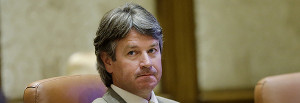Protecting free press in the Lone Star State

By Erik Telford
What started as a small investigation into the University of Texas law school’s admission process has grown into a Texas-sized scandal involving the state Legislature, an honest official’s reputation, and even the freedom of the press itself.
Reports indicate that under President Bill Powers, the University of Texas Law School has been accepting underqualified students. In the most extreme cases — 18 of which have come to light — their scores on the Law School Admissions Test wouldn’t get them into the weakest law schools in the country. These Longhorns had LSAT scores ranging from 150 — the usual cutoff point elsewhere — all the way down to 128, which can be achieved by filling in bubbles at random.
There’s one characteristic common to many of these success stories: connections to the politically powerful.
As progressive pundit Jim Schutze wrote, “this (University of Texas Law School) is a place everybody has always assumed is harder to get into than that famous eye-of-the-needle place in the Bible.”
HALL: The UT regent is on the hot seat for his investigations into law school admissions.
He went on to say that two individuals were responsible for “taking knives to the whole good-old-boy structure in Austin,” Watchdog.org investigative reporter Jon Cassidy and Wallace Hall, a University of Texas regent.
While Cassidy was questioned relentlessly on the investigation, the backlash against Hall was nothing short of disturbing. When Gov. Rick Perry appointed Hall, the regent soon discovered some evidence of admissions problems. He provoked a powerful repercussions in his efforts to fix them.
Hall was threatened with impeachment and removal by powerful legislators in both parties. What high crime did Hall commit? He, like nearly every other member of the Board of Regents, summarized his litigation history in his pre-appointment disclosure forms rather than name every specific case.
The lawmakers thought a threat would be enough to make Hall disappear, but he refused to back down, saying “if we want the senators and House representatives to be able to get people into universities, let’s just be up front about it.”
Where was the press? Schutze wrote that “even the establishment press turned on Hall, whose greatest sin was doing what the press is supposed to do — ask questions that make powerful people uncomfortable.”
Schutze reserved special criticism for the Texas Tribune, which bills itself as “the best of Texas politics.” After the National Review got House Appropriations Chair Jim Pitts to admit he had helped his own unqualified son gain entry to UT Law, the Texas Tribune allowed Pitts “to make an unchallenged defense . . . And there The Texas Tribune, which has received six-figure gifts from the university system, let the matter rest.”
The Texas Tribune did gain one scoop from the drawn out scandal. Texas House Speaker Joe Straus this week floated an idea to Executive Editor Ross Ramsey that floor access in the Legislature needs to be limited to “legitimate” journalists.
“I do know what I would like to see happen,” Straus said, “and I would like for the press association or the whatever organization is out there of media members to kind of maybe self-describe what’s legitimate and what’s not. I don’t know.”
Such a policy would be a huge blow to the free press. The Society of Professional Journalists has written in legal briefs that vetting reporters according to their views is impermissible under the First Amendment. When “a government official denies a reporter a press pass because of something he or she has published, the denial is presumptively unconstitutional.”
What started out as exposing a perk of the good ol’ boy system by a new media outlet and a determined official has blown up into a state level free press crisis fueled by retaliation and cover-ups.
Instead of cleaning up corruption and purging offenders from their ranks, politicians are circling the wagons. Important choices face Texas voters between now and November 2016. They deserve transparency, and only a truly free press can continue to shed light into the darker processes of Lone Star State politics.
Erik Telford is senior vice president at the Franklin Center for Government & Public Integrity.







